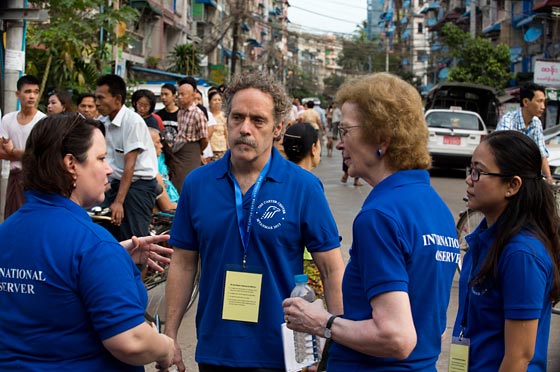
In 2020, The Carter Center began working to support good and transparent elections at home. At that time, David Carroll, director of the Carter Center’s Democracy Program, spoke about the Center’s decision to get involved in U.S. elections.
Q. For the first time, The Carter Center has decided to get involved in U.S. elections. Before we talk about what the Center is doing, can you tell us why you haven’t gotten involved before?
There are a few reasons:
Engaging in the U.S. is more complicated than in other countries because we don’t have a centralized election administration – we have a patchwork of about 10,000 jurisdictions across 50 states. (That, by the way, is one of several areas in which the U.S. falls short of international election standards.)
Also, in our international work, we require an official invitation and the welcome of major political parties. That’s difficult here because of the many jurisdictions and because, while we are a nonpartisan organization, our founder was the leader of the Democratic Party, and some people will always view us in that light.
But most important, I think, is that in our 30-plus years of observation, we’ve focused on places where democracy is either poised to take a step forward or in danger of taking a step backward. That often means countries characterized by political polarization, ethnic or racial divisions, and fears that election results won’t be accepted or seen as credible. Until the last five or 10 years – though the U.S. was far from perfect – it didn’t fit that category.
Q. And now it does?
Certainly a lot of what I just described applies to us in 2020.
Q. Is the Center going to observe the election?
We’re not sending observer teams out across the country in the way we do on international missions. There’s still the issues of 10,000 jurisdictions, official welcomes, and bias perceptions. We are in talks about observing one very specific part of Georgia’s post-election process – we’ll have more details as that develops.

David Carrol (center), director of the Center’s Democracy Program, meets with election observers during the November 2015 general elections in Myanmar. (Photo: The Carter Center)
Q. So what are you going to do?
Something we’ve learned in our international work is that one way to help ensure good elections is to increase public knowledge of electoral processes and to encourage election officials to make these processes as transparent as possible.
For that reason, we’ve launched a public information campaign to help enhance public knowledge and build confidence in the process.
We’re not naïve – there are real problems in 2020, and we plan to speak out about them when we think we can make a difference. But there are also some pretty good systems and safeguards in place, and we want people to know about those, too.
Q. Can you talk about some of the elements of the public information campaign?
One chunk of it will take place on social media – as so many things do these days!
We’re producing two animated videos – one that lays out voting options and another that focuses on the need for patience after Election Day, as the large number of mailed ballots we’re expecting is likely to delay the announcement of results beyond what Americans are used to. (But not longer than people in many countries where we work are used to waiting.)
There are many social media components associated with those videos that we’ll spread far and wide.
In addition, our stable of election experts are producing a number of reports, fact sheets, opinion pieces, and articles on various aspects of the electoral process. One of our associate directors, Avery Davis-Roberts, is also serving on the National Task Force on Election Crises and working with them on reports and statements.
We’ve also joined the brand-new Georgia Bipartisan Task Force on Safe, Secure, and Accessible Elections, which was put together by the secretary of state to offer expertise and guidance to Georgia’s election officials and help improve elections here in our home state.
We’ve got other materials coming – fact sheets, journalist trainings on transparency and international election standards, and a number of free virtual public conversations.
Q. Any final thoughts?
Just that a credible election that reflects the will of the people is in everyone’s best interest. And if you want to keep up with what we’re doing, check out cartercenter.org/vote.
Please sign up below for important news about the work of The Carter Center and special event invitations.